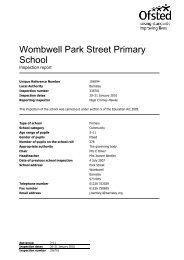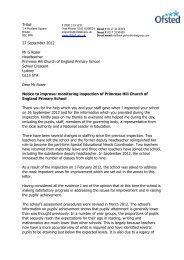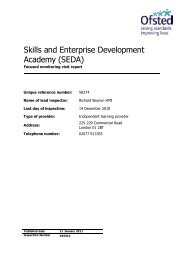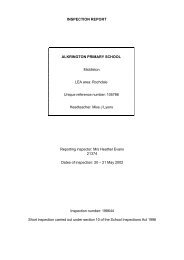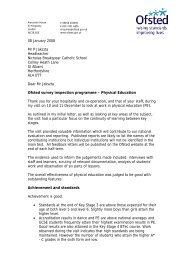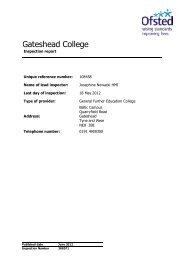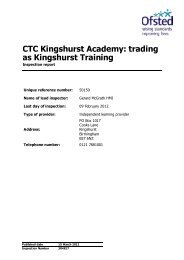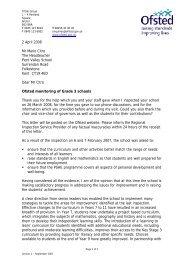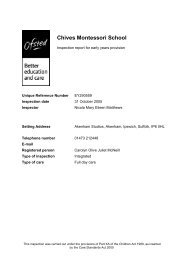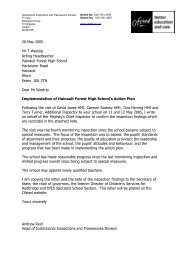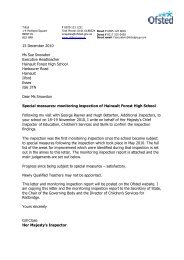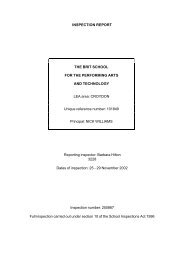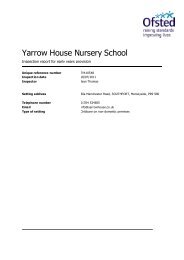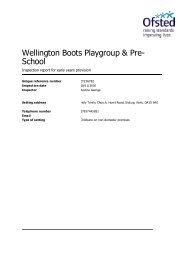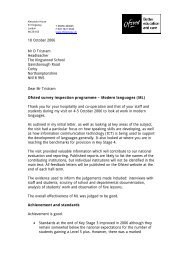3 February 2012 Mr D Baker Principal Thorns Community ... - Ofsted
3 February 2012 Mr D Baker Principal Thorns Community ... - Ofsted
3 February 2012 Mr D Baker Principal Thorns Community ... - Ofsted
You also want an ePaper? Increase the reach of your titles
YUMPU automatically turns print PDFs into web optimized ePapers that Google loves.
Serco Inspections<br />
Cedar House<br />
21 William Street<br />
Edgbaston<br />
Birmingham<br />
B15 1LH<br />
3 <strong>February</strong> <strong>2012</strong><br />
<strong>Mr</strong> D <strong>Baker</strong><br />
<strong>Principal</strong><br />
<strong>Thorns</strong> <strong>Community</strong> College<br />
Stockwell Avenue<br />
Brierley Hill<br />
DY5 2NU<br />
Dear <strong>Mr</strong> <strong>Baker</strong><br />
Special measures: monitoring inspection of <strong>Thorns</strong> <strong>Community</strong> College<br />
Following my visit with Sue Morris-King HMI, and my additional inspector colleagues<br />
Christine Bray and Lesley Voaden, to your college on 1–2 <strong>February</strong> <strong>2012</strong>, I write on<br />
behalf of Her Majesty’s Chief Inspector of Education, Children’s Services and Skills to<br />
confirm the inspection findings.<br />
This was the second monitoring inspection since the college became subject to<br />
special measures following the inspection which took place on 28 March 2011. The<br />
full list of the areas for improvement which were identified during that inspection is<br />
set out in the annex to this letter. The monitoring inspection report is attached and<br />
the main judgements are set out below.<br />
Progress since being subject to special measures – satisfactory.<br />
Progress since the previous monitoring inspection – satisfactory.<br />
Newly qualified teachers may only be appointed after consultation with HMI.<br />
This letter and monitoring inspection report will be posted on the <strong>Ofsted</strong> website. I<br />
am copying this letter and the monitoring inspection report to the Secretary of State,<br />
the Chair of the Interim Executive Board and the Director of Children’s Services for<br />
Dudley Metropolitan Council.<br />
Yours sincerely<br />
James McNeillie<br />
Her Majesty’s Inspector<br />
T 0300 123 1231<br />
Text Phone: 0161 6188524<br />
enquiries@ofsted.gov.uk<br />
www.ofsted.gov.uk<br />
Serco<br />
Direct T 0121 683 3888
Annex<br />
The areas for improvement identified during the inspection which took<br />
place in March 2011<br />
� As a matter of urgency, seek students’, parents’ and carers’ views on why<br />
students do not feel safe in school and take action to address their concerns.<br />
� Improve behaviour and reduce exclusions to below the national average by<br />
March <strong>2012</strong> by ensuring that procedures for managing behaviour are applied<br />
consistently and effectively by all staff.<br />
� Strengthen leadership and management at all levels beyond that of the<br />
headteacher by developing the skills of managers in monitoring, evaluating,<br />
analysing data and planning for improvement in order to promote consistency of<br />
approach, especially with respect to teaching.<br />
� Carry out a full audit of students’ needs in terms of community cohesion, plan<br />
and implement actions to promote their interest in, and understanding of, other<br />
faiths and cultures, and evaluate the impact of the actions on students’ social and<br />
cultural development.
Special measures: monitoring of <strong>Thorns</strong> <strong>Community</strong> College<br />
Report from the second monitoring inspection on 1–2 <strong>February</strong> <strong>2012</strong><br />
Evidence<br />
Inspectors observed the college’s work, scrutinised documents and met with the<br />
<strong>Principal</strong>, other senior and middle leaders, a group of teachers with no additional<br />
responsibilities, a variety of different groups of students, the Chair of the Interim<br />
Executive Board, representatives from the local authority and the college’s partner<br />
National Leader of Education (NLE).<br />
Context<br />
Since the last monitoring inspection, an Assistant <strong>Principal</strong> has been seconded from<br />
another school to the leadership team to focus specifically on student pastoral care<br />
and behaviour. He took up his role in November 2011.<br />
Achievement of pupils at the school<br />
Current predictions for the proportion of students who in <strong>2012</strong> are likely to achieve<br />
five GCSEs at grades A* to C including English and mathematics indicate an<br />
improvement on previous years’ results. If the predicted grades are achieved this<br />
would place the college in line with the current national average. Predictions are<br />
partly based on the number of students who have already achieved GCSE English<br />
and mathematics qualifications. College leaders have an accurate knowledge of<br />
individual students most at risk of not achieving this measure and there is a range of<br />
intervention strategies to support them. Awareness of the progress being made by<br />
students overall and by different groups of students is less secure. Unvalidated data<br />
from 2011 indicate that the achievement of disabled students and those with special<br />
educational needs was inadequate, which is in sharp contrast to previous years. The<br />
college does not have a secure awareness of the current progress of these groups of<br />
students.<br />
In lessons, the progress students make is linked directly with the quality of teaching<br />
and to their behaviour and attitudes. Where progress is strong, students of different<br />
abilities work well collaboratively, apply prior knowledge and skills to new learning<br />
and take responsibility for setting themselves targets for improvement. One barrier<br />
to good achievement for many students is their relatively weak application of<br />
accurate literacy skills, particularly in writing across the curriculum.<br />
The quality of teaching<br />
Inspectors observed a full range of teaching quality during the inspection. Some of<br />
the lessons were observed jointly with college leaders. Most were either satisfactory
or good. The strengths mentioned in the previous monitoring visit letter still apply,<br />
and there were other characteristics of good and better teaching observed. Where<br />
students make the best progress, lessons are planned well to take into account their<br />
prior knowledge and skills, and teachers incorporate a range of learning activities<br />
that actively involve students. In these lessons, teachers use their good subject<br />
knowledge and enthusiasm to motivate and engage students. In almost all lessons,<br />
even those judged less than good, teachers shared learning objectives with the<br />
students. This is clear evidence of the impact of recent teacher training. Students<br />
also spoke of this practice being more consistent in lessons and felt that it helped<br />
them to understand what they were learning and what they need to achieve. In a<br />
good Year 7 English lesson, students’ understanding of role play was developed well<br />
because they used the learning objectives to establish success criteria and set<br />
themselves targets.<br />
Students make less progress when teachers do not tailor activities to meet the needs<br />
of different groups, often because they make insufficient use of the available prior<br />
attainment information. This results in a lack of challenge because the teacher has<br />
the same expectation of what all students will learn, regardless of their different<br />
capabilities. Slow starts to lessons, laboured attention given by teachers to stating<br />
the learning objectives but then not expecting students to engage with them during<br />
the lesson and teachers talking too much are also features of weaker teaching. The<br />
in-class support for disabled students and those with special educational needs too<br />
often does not enable them to develop as independent learners. Additional adults<br />
are not strategically deployed to have greatest impact and, when in classrooms, their<br />
support is not always used efficiently. The quality of written marking is inconsistent<br />
and opportunities to reinforce the development of literacy skills are too often missed.<br />
Behaviour and safety of pupils<br />
In the lessons observed during the inspection, there were many examples of<br />
students demonstrating positive attitudes towards their learning. Students worked<br />
well together when given the opportunity to do so, supporting, and at times<br />
challenging and extending, each other’s learning. When teaching was less effective,<br />
students sometimes had no choice other than to be passive learners. Even when this<br />
was the case, students generally behaved well, with few incidences of low-level<br />
disruption. Students describe an improving picture of behaviour in their lessons.<br />
They do, however, describe some variation between lessons. Students in lower<br />
ability groups, in particular, reported that their learning was still disrupted at times.<br />
Greater consistency is emerging in teachers’ application of the college’s behaviour<br />
management approaches, although senior leaders are aware that inconsistencies<br />
remain. Praise is used increasingly well to motivate and encourage students,<br />
including those whose behaviour is more challenging, but the rewards system is not<br />
used frequently or consistently enough. The college has revised its rewards policy<br />
and this is about to be introduced to teachers and students.
Following the previous monitoring visit, the school took swift action to improve<br />
students’ movement around the building. The impact of this can be seen in more<br />
orderly movement inside the school buildings and a greater awareness of others’<br />
personal space, although some boisterous behaviour still remains. College leaders<br />
have sensibly placed a clear emphasis on encouraging self-managing behaviour<br />
during social and unstructured times. Some impact of this is evident around the<br />
school site but inspectors would endorse an emphasis on what the desired<br />
behaviours are in and out of lessons as a continued priority for the college.<br />
Students say that they feel safer in school, largely because incidences of serious<br />
misbehaviour have declined and there is a much calmer atmosphere around the<br />
school site. College leaders regularly seek the views of parents and carers. Their<br />
views on this aspect of the school’s work, as well as on all other aspects, are<br />
increasingly positive.<br />
The college’s analysis of behaviour has improved, which has given them a growing<br />
picture of information about behaviour patterns, particularly those of individuals.<br />
This analysis is at an early stage and is still not wide-ranging or systematic to take<br />
into account the possible impact on behaviour of aspect such as times of day,<br />
subjects, teachers or times in the term. The recently seconded Assistant <strong>Principal</strong><br />
has made a positive start in extending this analysis and directly challenging some of<br />
the inconsistencies that exist. He also understands the need to work with the leaders<br />
of teaching and learning to look much more closely at the learning needs of pupils<br />
who are displaying challenging behaviour. The planned revision of the behaviour<br />
policy has not yet taken place, although procedures for managing unwanted<br />
behaviour have been clarified. The impact of the college’s student support centre is<br />
evident in the analysis completed by the leader of this area, which includes taking<br />
into account students’ views of what helps them. Exclusion rates continue to decline,<br />
as do the numbers of internal referrals.<br />
Progress since the last monitoring inspection on the areas for improvement:<br />
� seek students’, parents’ and carers’ views on why students do not feel<br />
safe in school and take action to address their concerns – good<br />
� improve behaviour and reduce exclusions to below national average by<br />
March <strong>2012</strong> by ensuring that procedures for managing behaviour are<br />
applied consistently and effectively by all staff – satisfactory.<br />
The quality of leadership in and management of the school<br />
The <strong>Principal</strong> continues to set high expectations of achievement and has enabled<br />
more of the senior leadership team to have demonstrable impact on improving<br />
aspects of the college’s work. However, this impact is not considered as a whole to<br />
support systematic and strategic self-evaluation.
The college has a good amount of information about the current attainment of<br />
individual students. This is particularly strong for Year 11 students. Identification of<br />
and intervention to tackle individual underachievement in Year 11 is related to those<br />
students not on track to achieve target grades. Leaders at all levels, including heads<br />
of house as well as form group mentors are involved in this, and the impact of these<br />
interventions is tracked and evaluated. Therefore, on an individual basis, the extent<br />
of a Year 11 student’s progress is known. There is not, however, a strategic<br />
overview which enables leaders to identify which groups of students are making<br />
expected, slow or rapid progress in all year groups. The comprehensive tracking<br />
information available to college leaders means that it should be possible to gather<br />
quickly this overview.<br />
Targets are set for students which are based on prior attainment data, nationally<br />
expected progress as well as professional dialogue. The review of these targets at<br />
classroom and subject level, to take into account previously quick or good current<br />
progress is inconsistent, resulting in some students having already exceeded the<br />
targets that continue to be set. A calendar of regular meetings has been established<br />
to increase the level of accountability of middle leaders and to extend their<br />
understanding of how data analysis supports increased achievement. These<br />
meetings have had a positive impact, for example in relation to the identification of<br />
Year 11 students at risk of not achieving in one or more subjects. There is, however,<br />
an insufficient focus on the progress made by groups of students and variability in<br />
the effectiveness of middle leadership remains.<br />
Those taking the lead on improving teaching have secure long-term development<br />
plans with an appropriate focus on systematically developing teaching and learning.<br />
The impact of their work so far is evident in the greater consistency with which<br />
teachers are considering learning objectives when planning lessons, and the use of<br />
the college’s lesson planning process. These leaders have a secure understanding of<br />
what makes for good teaching and offer an appropriate level of support and<br />
challenge to colleagues in the subject areas for which they have particular<br />
responsibilities. As yet, they have not established systems to enable a broader<br />
awareness of strengths and weaknesses in all aspects of the quality of students’<br />
learning across subjects. Evaluation of the impact of teaching over time, for example<br />
as shown by the quality of students’ work and the progress different groups of<br />
students make, is not secure.<br />
As aspects of the college’s work have improved, it has become evident that the<br />
provision and outcomes for disabled students or those with special educational<br />
needs is a serious cause for concern. There is no systematic way of identifying which<br />
students have special educational needs and which are underachieving as a result of<br />
previous and currently weak teaching. Similarly, the review and evaluation of the<br />
progress and current needs of those previously identified is weak. Students who join<br />
the college with specific reading, writing and communication difficulties are not given<br />
any targeted intervention to help them to make rapid progress as they move
through the school. The deployment of the college’s learning support practitioners is<br />
not providing good value for money.<br />
The work of college leaders on improving students’ social and cultural development<br />
is evident in students’ better attitudes to learning and the ways in which groups of<br />
students from different backgrounds get on well together. The other positive<br />
developments referred to in the previous monitoring inspection letter remain.<br />
However, the impact of these has not been systematically evaluated.<br />
A revised curriculum for Key Stage 4, and some modifications to the curriculum at<br />
Key Stage 3, have now been finalised to begin from September <strong>2012</strong>. An information<br />
evening for parents and carers was held during the monitoring inspection, and the<br />
college’s own evidence indicates that a very high proportion of parents and carers<br />
attended and were very positive about the proposed changes.<br />
Members of the interim executive board continue to add capacity and to gather firsthand<br />
evidence of the college’s work through visits to the college and discussions<br />
with middle and senior leaders. As was the case at the time of the previous visit,<br />
there is no systematic way in which members evaluate the progress the college is<br />
making in relation to the priorities for improvement identified by <strong>Ofsted</strong>, or how<br />
different groups of students are currently achieving.<br />
Progress since the last monitoring inspection on the areas for improvement:<br />
� strengthen leadership and managements at all levels beyond that of the<br />
headteacher by developing the skills of mangers in monitoring, evaluating,<br />
analysing data and planning for improvement in order to promote<br />
consistency of approach, especially with respect to teaching – satisfactory<br />
� carry out a full audit of students’ needs in terms of community cohesion,<br />
plan and implement actions to promote their interest in, and<br />
understanding of, other faiths and cultures, and evaluate the impact of<br />
the actions on students’ social and cultural development – satisfactory.<br />
External support<br />
The college’s partner NLE, commissioned by the local authority, continues to support<br />
leadership capacity and provides training and development for leaders and teachers.<br />
This tailored package of support is highly valued by the <strong>Principal</strong> and continues to<br />
have a positive impact. This is evident, for example, in aspects of teaching and<br />
middle leadership. The local authority has a systematic process by which it evaluates<br />
this support. There has been a lack of clarity about the respective roles of the NLE<br />
and authority officers in evaluating the school’s progress towards being removed<br />
from special measures. This was explored during the monitoring inspection and the<br />
local authority and NLE now intend that future monitoring and evaluation reviews
will be more evaluative and therefore decrease the need for lengthy discussions at<br />
review board meetings or for further extensive evidence to be provided.



